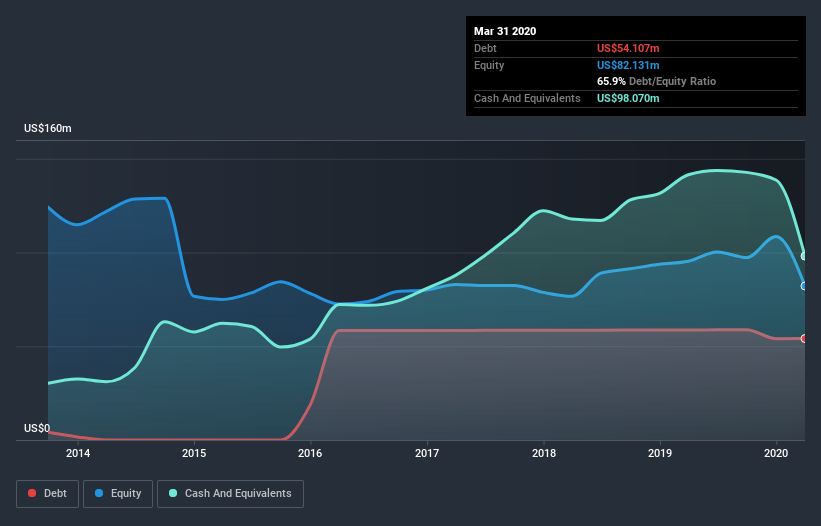
Howard Marks put it nicely when he said that, rather than worrying about share price volatility, 'The possibility of permanent loss is the risk I worry about... and every practical investor I know worries about.' It's only natural to consider a company's balance sheet when you examine how risky it is, since debt is often involved when a business collapses. As with many other companies Orca Energy Group Inc. (CVE:ORC.B) makes use of debt. But the real question is whether this debt is making the company risky.
What Risk Does Debt Bring?
Generally speaking, debt only becomes a real problem when a company can't easily pay it off, either by raising capital or with its own cash flow. Part and parcel of capitalism is the process of 'creative destruction' where failed businesses are mercilessly liquidated by their bankers. However, a more usual (but still expensive) situation is where a company must dilute shareholders at a cheap share price simply to get debt under control. Of course, plenty of companies use debt to fund growth, without any negative consequences. The first thing to do when considering how much debt a business uses is to look at its cash and debt together.
Check out our latest analysis for Orca Energy Group
How Much Debt Does Orca Energy Group Carry?
You can click the graphic below for the historical numbers, but it shows that Orca Energy Group had US$54.1m of debt in March 2020, down from US$58.7m, one year before. However, it does have US$98.1m in cash offsetting this, leading to net cash of US$44.0m.

A Look At Orca Energy Group's Liabilities
Zooming in on the latest balance sheet data, we can see that Orca Energy Group had liabilities of US$53.2m due within 12 months and liabilities of US$101.7m due beyond that. Offsetting these obligations, it had cash of US$98.1m as well as receivables valued at US$31.3m due within 12 months. So it has liabilities totalling US$25.5m more than its cash and near-term receivables, combined.
Since publicly traded Orca Energy Group shares are worth a total of US$137.6m, it seems unlikely that this level of liabilities would be a major threat. Having said that, it's clear that we should continue to monitor its balance sheet, lest it change for the worse. While it does have liabilities worth noting, Orca Energy Group also has more cash than debt, so we're pretty confident it can manage its debt safely.
In addition to that, we're happy to report that Orca Energy Group has boosted its EBIT by 49%, thus reducing the spectre of future debt repayments. There's no doubt that we learn most about debt from the balance sheet. But it is Orca Energy Group's earnings that will influence how the balance sheet holds up in the future. So when considering debt, it's definitely worth looking at the earnings trend. Click here for an interactive snapshot.
Finally, a business needs free cash flow to pay off debt; accounting profits just don't cut it. Orca Energy Group may have net cash on the balance sheet, but it is still interesting to look at how well the business converts its earnings before interest and tax (EBIT) to free cash flow, because that will influence both its need for, and its capacity to manage debt. Over the last three years, Orca Energy Group actually produced more free cash flow than EBIT. That sort of strong cash conversion gets us as excited as the crowd when the beat drops at a Daft Punk concert.
Summing up
Although Orca Energy Group's balance sheet isn't particularly strong, due to the total liabilities, it is clearly positive to see that it has net cash of US$44.0m. And it impressed us with free cash flow of US$19m, being 117% of its EBIT. So is Orca Energy Group's debt a risk? It doesn't seem so to us. The balance sheet is clearly the area to focus on when you are analysing debt. But ultimately, every company can contain risks that exist outside of the balance sheet. Be aware that Orca Energy Group is showing 3 warning signs in our investment analysis , and 1 of those is potentially serious...
Of course, if you're the type of investor who prefers buying stocks without the burden of debt, then don't hesitate to discover our exclusive list of net cash growth stocks, today.
If you decide to trade Orca Energy Group, use the lowest-cost* platform that is rated #1 Overall by Barron’s, Interactive Brokers. Trade stocks, options, futures, forex, bonds and funds on 135 markets, all from a single integrated account. Promoted
New: AI Stock Screener & Alerts
Our new AI Stock Screener scans the market every day to uncover opportunities.
• Dividend Powerhouses (3%+ Yield)
• Undervalued Small Caps with Insider Buying
• High growth Tech and AI Companies
Or build your own from over 50 metrics.
This article by Simply Wall St is general in nature. It does not constitute a recommendation to buy or sell any stock, and does not take account of your objectives, or your financial situation. We aim to bring you long-term focused analysis driven by fundamental data. Note that our analysis may not factor in the latest price-sensitive company announcements or qualitative material. Simply Wall St has no position in any stocks mentioned.
*Interactive Brokers Rated Lowest Cost Broker by StockBrokers.com Annual Online Review 2020
Have feedback on this article? Concerned about the content? Get in touch with us directly. Alternatively, email editorial-team@simplywallst.com.
About TSXV:ORC.B
Orca Energy Group
Engages in the exploration, development, production, and supply of petroleum and natural gas to the power and industrial sectors in Tanzania.
Flawless balance sheet slight.


